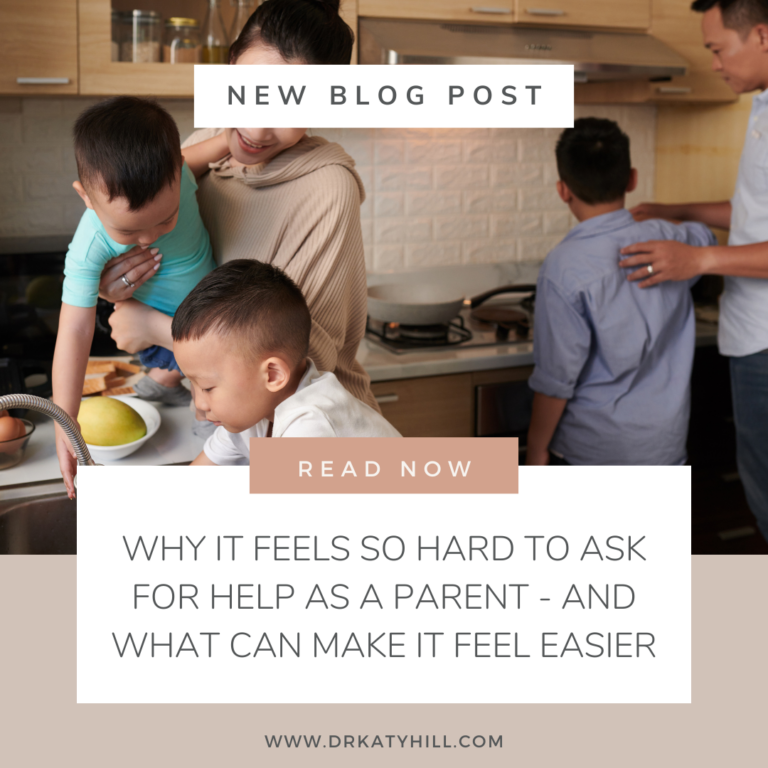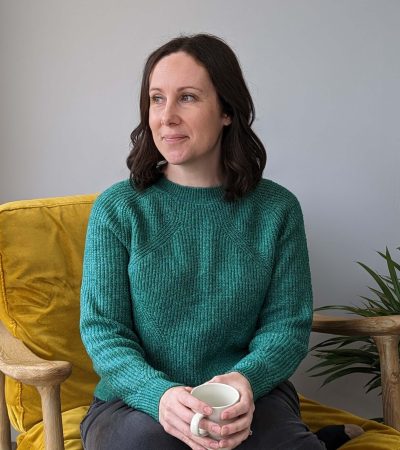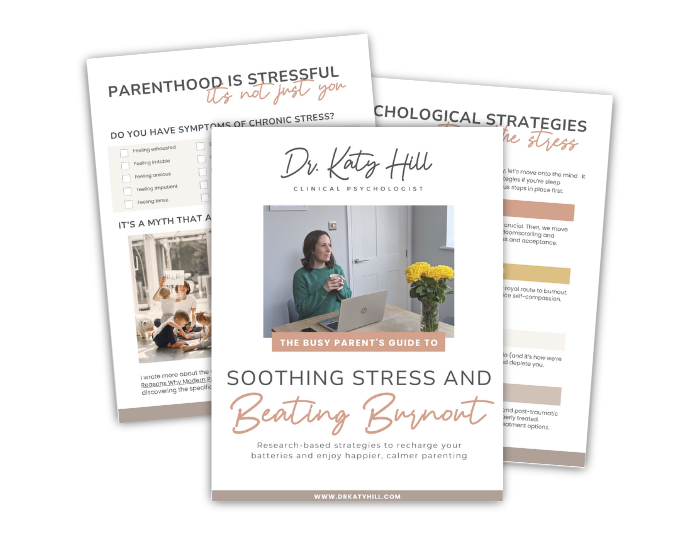The parents I work with in online therapy for parental burnout are incredibly thoughtful, caring and conscientious. They care deeply about their children, their relationships, and doing things well. They’re usually the ones others rely on. The strong ones. The capable ones. The ones who just get on with it.
And yet – quietly, privately – they’re struggling. They’re exhausted. Anxious. Snapping more than they want to. They feel guilty, stretched, sometimes ashamed of their parenting. And they’re afraid of what that might mean about them. What it might mean for their children’s wellbeing.
But telling anyone about that? Asking for help? That feels impossibly hard.
If you’re in that place – where you’re finding it difficult to reach out, even when you know something needs to change – I want you to know that you’re not alone. There are many really good reasons it can feel so vulnerable to ask for support, especially as a parent. Some of them are personal. Some are cultural. All of them are valid.
Let’s take a look at why asking for help can feel so uncomfortable as a parent – and then I’ll share a few ideas that might help make it feel a little easier.
Reason #1: You’ve internalised the idea that you should be able to do it all
Many of us grew up believing that being a ‘good parent’ means being completely capable, always available, endlessly calm. That parenting should come naturally and feel easy and fun. According to that myth, struggling as a parent is the same as failing.
And so we push through. We tell ourselves it’s just a phase. That others are coping, so we should be able to as well. That we just need to try harder.
It’s often the most conscientious parents who carry this belief the deepest – the ones who care the most, who strive the hardest, who hold themselves to impossible standards. If that’s you, please know this: your struggle doesn’t mean you’re not doing a good job. It means you’re doing a difficult job, often with too little support.
You were never meant to parent in isolation. And you can’t ‘push through’ burnout.
Reason #2: You’ve learned that asking for help isn’t safe
For many parents, this runs much deeper than pride or perfectionism. It’s about safety.
Perhaps you grew up in a home where emotions were dismissed, or where your needs weren’t consistently met. Perhaps asking for help led to disappointment, criticism, or being ignored. Over time, it became safer not to ask at all.
And so now, even as an adult, even when life feels unmanageable, the idea of reaching out still brings up fear. Maybe you worry that no one will understand, or that you’ll be judged. Maybe a part of you believes that your needs don’t matter or that admitting them makes you weak.
These aren’t personality flaws. They’re protective patterns, shaped by your history. And they can be unlearned.

The Parental Burnout Quiz
Curious what your own parental burnout score is? Download the free assessment and get your score – plus expert tips on how to reduce it.
Reason #3: You’re living in a culture that glorifies doing it alone
We don’t talk enough about how much modern parenting has changed. Many of us are raising children without the village that once existed – without the regular presence of extended family, neighbours, or even friends who can drop in without notice.
It’s not just about parenting culture though, our whole Western culture is individualistic; celebrating self-sufficiency and self-actualisation. We’re praised for being able to ‘do it all’ without needing anyone.
But parental burnout research shows that rates of parental burnout vary widely according to the culture that parents live in – it’s prevalence is way higher in individualistic cultures like the United States and Western Europe and significantly lower in more collectivist cultures like in Africa or Asia. Even accounting for economic differences, when caregiving is shared and community support is the norm, rates of parental burnout are extremely low.
It’s not that you’re not coping. It’s that you were never meant to cope like this, alone.
Reason #4 You’re worried about what others will think
Even when the exhaustion becomes too much, many parents hesitate to seek help because they’re afraid of how others might judge them – maybe they’ll think they’re overreacting or see them as a bad parent.
Often parents tell me it’s especially scary to reach out to a professional – what if they start crying and can’t stop or what if the professional thinks that they’re not parenting properly and involves the social services or even takes their kids away?
Not all these fears are unwarranted – it’s wise to reach out to someone who is wise and compassionate, someone who’s not just going to brush you off or look down on you. Unfortunately, not all your friends and family are equipped to help you.
It can be helpful to reach out to a professional who isn’t phased by encountering a tearful parent because they meet them all the time – your GP or health visitor won’t be at all surprised that you’re struggling. And a therapist who specialises in working with parental mental health won’t be surprised at all, they’ll be delighted you reached out – I’m always happy when I get a new email from someone, knowing I’ll be able to offer them some comfort.
And good therapy isn’t about judgement. It’s about understanding. It’s a space where you don’t have to hold it together. You just get to be held in mind and put first.
Reason #5: You’re unsure what kind of help actually helps
When you’re already stretched thin, even figuring out where to start can feel overwhelming. Do you need therapy? Coaching? A break? Who do you talk to? What kind of support will actually make a difference?
For many parents, it’s not that they’re unwilling to get help – it’s that they don’t know what would help. And the idea of investing time, money, or energy into something uncertain can feel like too much. I wrote a blog previously about how to find a therapist for parental burnout that might help here.
what can make it easier?
If you’ve read this far then I’m assuming you’re considering asking for help but have some of these internal barriers preventing you. Here are a few things that might help shift those barriers:
1. Start with talking to yourself – honestly and kindly
Before you speak to anyone else, see if you can speak kindly to yourself. Try something supportive like: “I’m carrying a lot right now – it makes sense that I’m finding it hard.”
Naming your struggle without shame is the first step. Not because it changes everything overnight, but because it creates space. Space to soften. Space to consider: “What if I didn’t have to do this alone?”
2. Let go of the idea that asking for help means you’ve failed
It might help to reframe support not as a last resort or an act of failure, but as a wise, proactive step. You’d likely recommend this step for a close friend of yours and you’d definitely seek help for your child if they were struggling so why not do it for yourself?
Some therapy clients tell me that they were finally able to ‘allow’ themselves to care for themselves when they realised how much it would benefit their wider family. That if they felt more rested, refreshed, positive and balanced that the whole household would feel that knock on effect. When you feel supported, you’re better able to parent in the way you most want to.
3. Begin small
Support doesn’t have to mean signing up for weekly therapy or announcing your burnout to the world. It might look like answering more honestly than ‘I’m fine’ when someone asks how you are, or finally saying yes when a friend offers to do the school run for you sometimes.
And therapy doesn’t start with a 6 month commitment; I offer a free, no-pressure introductory 15 minute zoom call to any parent who wants to chat about what therapy with me could look like.
Start with what feels doable. You don’t need to do it all. You just need to start.
final thoughts
If you’ve been feeling like the version of you that laughs more, enjoys your kids more, responds with patience more is slowly slipping away – I want you to know that change is possible.
There is help out there. Not the kind that tells you to #bemoregrateful or that suggests a bunch of self-care practices to add to your to-do list. The kind that gets it, that sees you. And gently helps you find your way back to yourself.
Therapy won’t make the demands of parenting disappear. But it can help you carry them with more ease. It can help you feel calmer, more grounded, and more able to show up as the parent you want to be.
And you don’t have to know exactly what you need before reaching out.
a gentle next step
If you’d like to talk about what support could look like for you, I offer a free, no-obligation intro call. There’s no pressure to commit – just space to ask questions, be heard, and see if it feels like a good fit.








